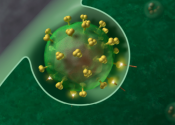Study confirms how RNA chemical modifications benefit HIV-1
A chemical modification in the HIV-1 RNA genome whose function has been a matter of scientific debate is now confirmed to be key to the virus's ability to survive and thrive after infecting host cells, a new study has found.
Apr 11, 2024
0
36








